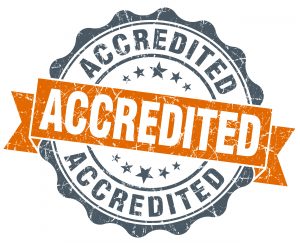 In Part I of this series, we gave you a general overview of what you should consider when choosing a massage therapy school. One of those factors is program length, which we discussed in Part II. Another one of those factors is accreditation, which we will explain here.
In Part I of this series, we gave you a general overview of what you should consider when choosing a massage therapy school. One of those factors is program length, which we discussed in Part II. Another one of those factors is accreditation, which we will explain here.
So what is accreditation?
According to the U.S. Department of Education, “Accreditation is the recognition that an institution maintains standards requisite for its graduates to gain admission to other reputable institutions of higher learning or to achieve credentials for professional practice. The goal of accreditation is to ensure that education provided by institutions of higher education meets acceptable levels of quality.”
At its most basic, this means that for a school to be accredited, it has to meet quality standards and maintain them. Think of your driver’s license as accreditation, for a moment. To earn your driver’s license you have to pass a series of tests—you can’t just walk into the DMV and purchase a driver’s license. And once you have your driver’s license, you have to maintain a good driving record or your driver’s license will be revoked.
Massage therapy schools must not only meet certain criteria to become accredited, but once accredited are reevaluated periodically to make sure that they are still providing a quality education to their students.
Why choose an accredited school?
Let’s go back to the driver’s license analogy for a second. Imagine that a friend wants to borrow your car. Would you feel safer entrusting your car to a friend that has a driver’s license? Or a friend who has never passed a driving test?
Choosing a massage therapy school is a big decision. By choosing an accredited school, you know that your education meets an official standard of quality. In addition to receiving a quality education, there are other benefits.
Accreditation can also mean an easier path to licensure. Joseph Rongo, co-director of ASIS (Arizona School for Integrative Studies) Massage Education, says, “In Arizona, graduating from an accredited school means you do not have to take any external exams and your massage license can be processed immediately after graduation.”
Director of Admission for Central Maryland School of Massage, Alyssa Robbin, says accreditation definitely does help ease the transition from student to professional. “An education from an accredited massage therapy school is recognized in other states and even overseas.”
And accredited schools can make paying for school easier.
“When you choose a school that is accredited you have more options, especially with financial aid,” says Robbin.
“Accreditation allows us to offer our students Federal Student Aid,” says Director of Admissions for Finger Lakes School of Massage, Jessica English.
To find out more about Federal Financial Aid and other means of paying for school, read the next article in this series. Follow us on Facebook and Twitter.